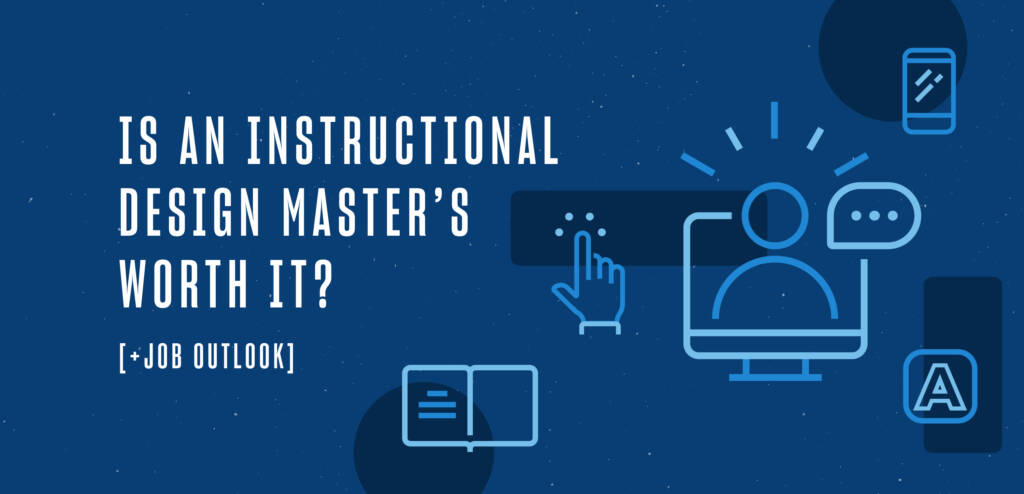Tech literacy is essential for today’s educators. Classroom technology has come a long way since slide projectors and laser pointers — students in grades pre-K–12 have now grown up with Smartboards, Chromebooks, virtual field trips and even artificial intelligence.
Educators who incorporate current technology into their classrooms can streamline the learning process, make learning more accessible, prepare young people to be responsible digital citizens and support students’ career readiness — however far in the future that may be.
There are many professional development opportunities designed to help educators understand and deploy learning technologies. One option is to earn a degree focused on educational technology, which can broaden teachers’ professional horizons and prepare them for the future of education.
What Is Educational Technology?
Educational technology, or ed tech, refers to the tools and media designed to aid in the communication and transfer of knowledge. Teachers incorporate these tools into their classroom instruction, using them to support both their teaching methods and their students’ learning styles. Ed tech can also help teachers develop new and innovative ways of delivering course content, even redesigning their curriculum to include new media and tech tools.
It’s important to note that the shortened term “ed tech” can refer to two different things:
- Any form of “educational technology”
- An “educational technician,” a professional who provides supportive educational services for students in K–12 schools, often in special education classrooms (alongside special education teachers)
To avoid confusion, take note of the meaning and context whenever you encounter this term.
Why Is Educational Technology Important?
Besides providing a new and exciting way of relaying course material, educational technology makes a difference in the classroom by:
- Helping teachers better connect with students
- Helping students better engage with course material
- Providing instructional solutions for learners
- Prioritizing student-centered learning through familiar tech
- Personalizing and differentiating learning environments for students with unique needs
- Preparing students for life beyond the classroom
Educational Technology Examples
Ed tech is a broad umbrella encompassing many different kinds of learning tools, including (but not limited to):
- Virtual learning hubs like Blackboard
- Real-time video conferencing like Zoom and Google Meet
- In-school computers and tablets
- Presentation tools like Smartboards
- Augmented and virtual reality, including virtual field trips
- Gamification of lessons, such as contests or apps like Prodigy
- Artificial intelligence, including reading assistance software
- Edutainment media like Schoolhouse Rock! and Mark Rober
- Robotics and STEM/STEAM engagements
- Lesson planning apps like Planboard
What Can You Do With an Educational Technology Degree? [+ Salary Expectations]
To gain a comprehensive understanding of ed tech tools, developments and teaching methods, working educators can earn their Master of Education degree with a specialization in educational technology and innovation. There are dozens of tech-forward careers available for education professionals with advanced degrees.
The salaries below are annual averages based on 2023 data. Ranges will fluctuate and are dependent upon employer, candidate’s experience, geographic region, etc.
Careers in education
- Classroom teacher | $40,709
- Distance learning instructor | Varies
- Computer instructor | $62,477
- Media instructor or specialist | $47,918
- Curriculum developer | $67,096
- Instructional designer | $55,660
- Information technology specialist | $59,248
- Education specialist | $52,740
- School administrator | $110,463
Ed tech tools and knowledge aren’t confined to the classroom. Knowing how to leverage instructional technology to convey information can be a highly valuable skill set in the corporate world, the military, the manufacturing industry and beyond.
Careers outside of education
- Human resources specialist | $65,981
- Corporate trainer | $61,436
- Adult education instructor | $32,504
- University professor | $58,113
- Traveling lecturer | $57,445
- Technical writer | $62,031
- Technology consultant | $86,777
- Project manager | $83,827
- Training specialist | $56,285
- Media relations manager | $75,784
- Development director | $79,577
- Operations manager | $69,797
- Media producer | $58,117
- Event coordinator | $58,059
Many of the careers above require additional training or degrees. Having a foundation in instructional technology, however, can show potential employers that you’re a savvy and forward-thinking professional with a keen sense of how people digest information.
What Does a Degree in Educational Technology Entail?
At the graduate level, educational technology is offered as both a master’s degree and a specialization within a Master of Education program. Most master’s degrees take two years to complete on a full-time class schedule.
The goal of any ed tech program is to give educators an in-depth understanding of digital learning tools, as well as the appropriate instructional methods that facilitate a tech-enabled learning experience. Alongside courses that cover educational research or the psychology of learning, educational technology programs may offer courses in any of the following subjects:
- Foundations of educational technology
- Applications of learning theories to tech-enabled instruction
- Learning analytics
- Instructional design
- Universal learning design
- Integrated media learning environments
- Responsible internet use in K–12 instruction
- Educational games and simulations
- Distance instruction and leadership
- Virtual project management
- Educational and digital equity
- Teaching digital natives
- Digital literacy
- Co-teaching and collaborating with technology
Different graduate programs may offer additional electives or even a practical component, such as joining a classroom to observe and model instructional theories. Graduate-level ed tech instructors are typically seasoned educators who have extensive experience working with and adapting to evolving technologies in the classroom.
Is an Educational Technology Degree Right For Me?
If you have a passion for technology and a drive to improve education for all learners, a career in educational technology might be the ideal fit. Those who pursue a degree in ed tech often possess:
- A deep interest in technology
- A desire to contribute to educational progress
- A strong support of educational equity
- The ability to teach others how to use tech tools
- Analytical skills
- The ability to solve problems creatively through technology
As you research ed tech graduate programs, be sure to consider the following practical aspects:
- The school’s or program’s accreditation status
- Part-time or accelerated enrollment options
- Scheduling flexibility
- Graduation rates
- Available financial aid options
- Curriculum and specializations
- Capstone, thesis or internship requirements
The Technology & Innovation specialization in the University of San Diego’s Master of Education program supports degree candidates in becoming transformative educational technology leaders in K–12 schools. Candidates learn to integrate traditional pedagogical practices with current technology tools, and will develop an understanding of how new learning technologies can facilitate educational equity.
Designed with working professionals in mind, this MEd program is offered 100% online, so students can access course materials on a schedule that works for them. To learn more about this innovative graduate program, connect with a USD enrollment advisor today.



![Top 10 Instructional Technology Tools [+How They Benefit You]](https://onlinedegrees.sandiego.edu/wp-content/uploads/2022/12/ldt_blog_top10idtools-1-1024x576.png)
![Top 10 Instructional Design Careers [+ Salary Guide]](https://onlinedegrees.sandiego.edu/wp-content/uploads/2022/03/ldt_blog_top10idcareers-1024x576.png)